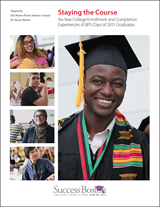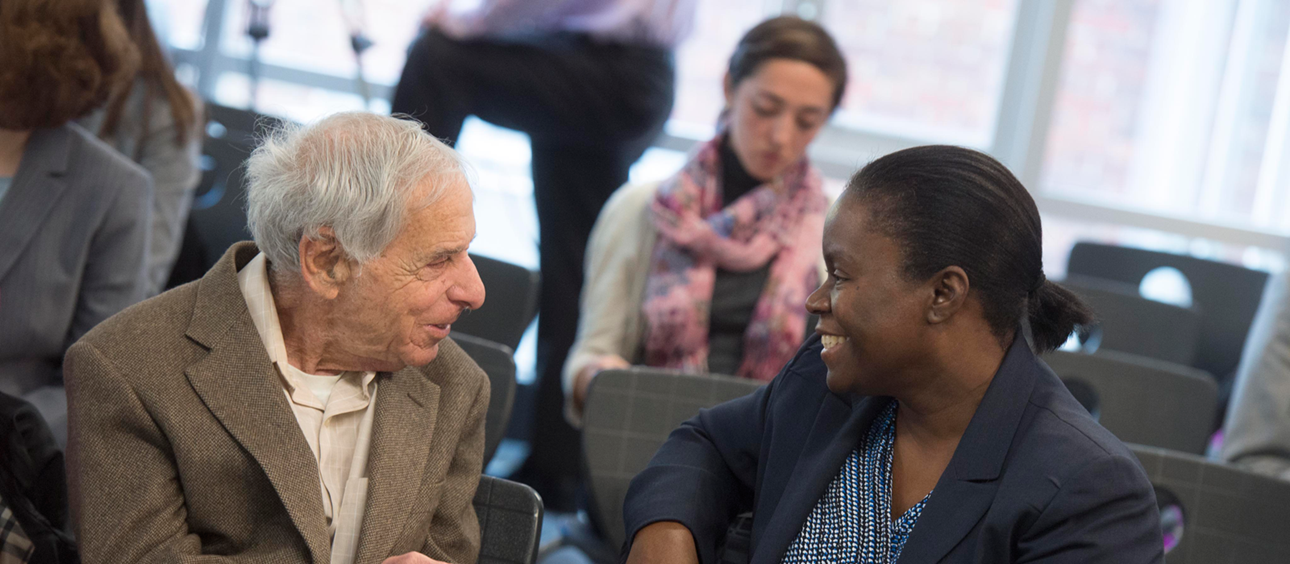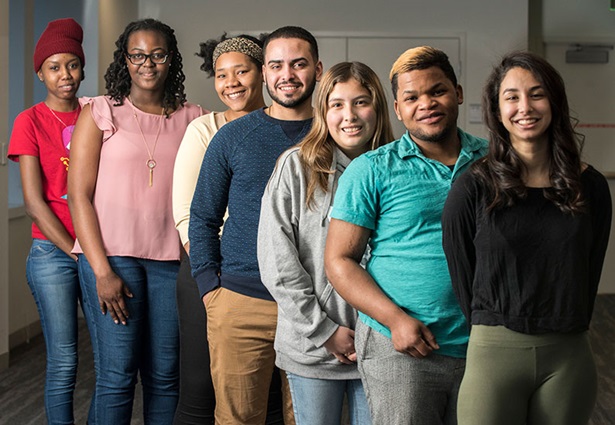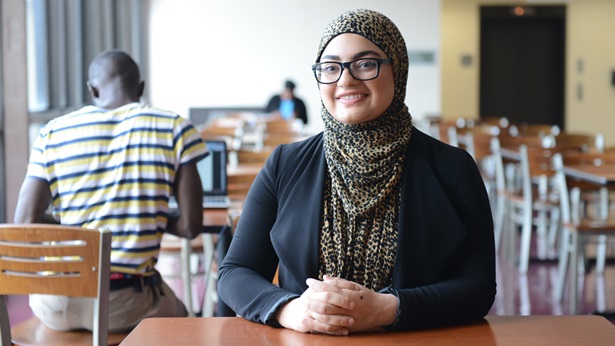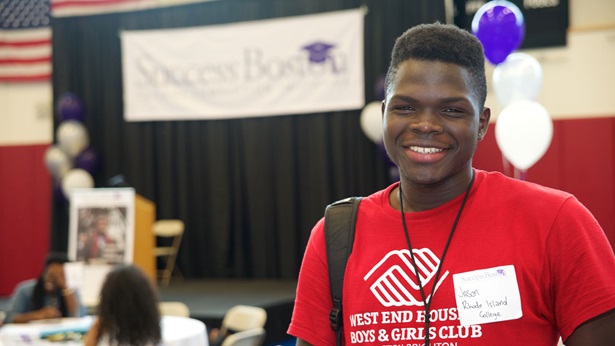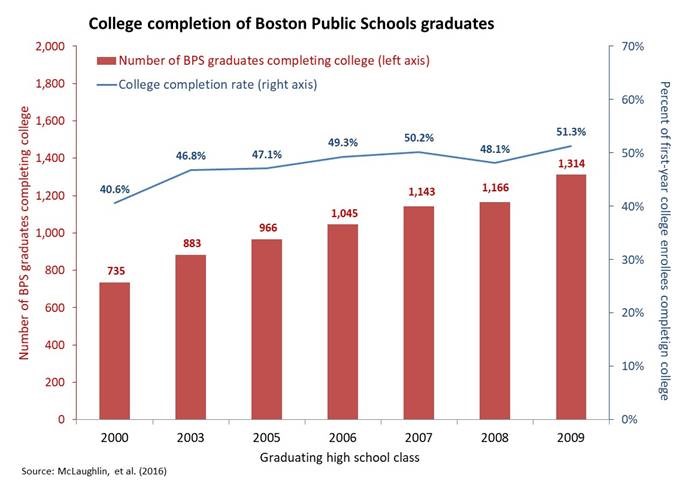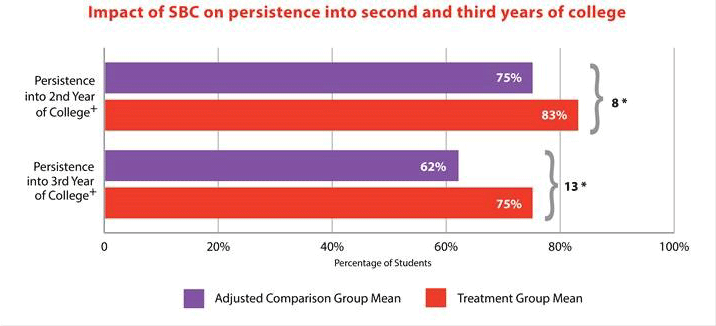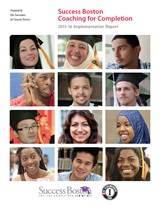In November, 2008, the Boston Private Industry Council and the Boston Public Schools, with funding support from the Carnegie Corporation of New York and the Boston Foundation, released the findings of the nation’s first extensive analysis of Boston Public Schools ("BPS") graduates’ outcomes after high school. The report, Getting to the Finish Line: College Enrollment and Graduation, was the result of tracking the seven-year outcomes of every BPS student who graduated from high school in June, 2000.
The report showed that only 35% of BPS high school graduates from the class of 2000 who enrolled in college completed a 2- or 4-year degree within seven years of graduating from high school. The report provided additional detail about student outcomes by race and ethnicity, gender, and type of high school attended, highlighting significant achievement gaps in both college enrollment and college completion rates. For example, college completion rates for black and Hispanic college enrollees from BPS were substantially lower than those for white and Asian students. Similarly, female high school graduates were both more likely to enroll in college and more likely to complete college than male graduates.
These sobering results catalyzed a community-wide response to support Boston’s students. On November 17, 2008, Mayor Thomas Menino, the Boston Foundation, and the BPS announced Success Boston—a citywide college completion initiative aimed at dramatically increasing the number of BPS students completing college. Specifically, Mayor Menino called for a 50% increase in the college graduation rate for college enrollees from the BPS class of 2009 and a doubling of the college graduation rate for college enrollees from the BPS class of 2011.
A significant intervention of Success Boston is transition coaching, through which students in the last year of high school are paired with professional coaches for the first two years of college. Success Boston coaches help their students tackle multiple obstacles in college: They guide students through routine but challenging steps, like course registration or FAFSA completion, and help them navigate hurdles, like unexpected charges on tuition bills.
In June 2016, the Boston Foundation published Reaching for the Cap and Gown, a follow-up report by the Boston Private Industry Council and Abt Associates that examined college completion outcomes for the BPS Class of 2009—the first cohort of students to receive coaching through Success Boston. The report found that 51.3% of first-year college enrollees from the BPS Class of 2009 completed a degree within six years of high school graduation—within one percentage point of the 52% goal set in 2008 (see Figure 1). Equally impressive was the gain in the number of BPS graduates completing college: 1,314 from the Class of 2009, compared to 735 from the Class of 2000—the equivalent of a 79% increase. Furthermore, while BPS students coached through Success Boston who enrolled in four-year colleges completed at similar rates as students without a coach (about 60%), coached students had an edge when they attended two-year colleges: 35% completed a degree within six years, compared with 24% of non-coached students.
This study also disaggregated completion outcomes by race and ethnicity, gender, type of high school, and type of college attended. It documented some continuing gaps in achievement. College completion rates for black and Hispanic college students continued to be lower than those for white and Asian students. Female college enrollees still completed college at higher rates than their male classmates. Finally, students who had graduated from one of the three BPS exam schools were far more likely to complete college than their peers from the other high schools.
In October 2014, the Boston Foundation received a Social Innovation Fund grant of $2.7 million from the Corporation for National and Community Service, allowing coaching to expand from 300 to 1,000 students per cohort—close to half of all BPS graduates who enroll in college each fall. As a result, more than 5,000 Boston students have received transition coaching through Success Boston since 2009.
On March 23, 2017, the Boston Foundation released The Power of Coaching, a new report by Abt Associates, which showed that BPS graduates who received coaching through Success Boston have significant advantages over other students. While previous studies had found that coached students have higher persistence than non-coached students, the rigorous design of this evaluation provided the first causal evidence that differences in outcomes can be attributed to the students’ participation in coaching.
The analysis focused on 2013 and 2014 BPS high school graduates who entered college in the fall immediately after their high school graduation. Results showed that coached students are more likely than non-coached students to persist into their second and third years of college (see Figure 2). In fact, 83% of coached students and 75% of non-coached students persisted into the second year of college—a positive and statistically significant impact equivalent to an 11 percent increase in persistence. In addition, both groups persisted into the second year at higher rates than national average of 72 percent. Furthermore, fully three-quarters (75%) of SBC students persisted to the third year, compared with less than two-thirds (62%) of non-coached students—equivalent to a 21 percent increase in persistence.
At the same time, while the impacts of coaching on persistence and academic achievement were positive and statistically significant for both underrepresented (Black, Hispanic) and not-underrepresented (White, Asian) groups, they seemed to be driven primarily by female students: The impacts of coaching were positive and statistically significant for female students but not statistically significant for male students.
Overall, according to the report authors, the effects of coaching can be characterized as “positive and large.” Coached students were persisting longer, achieving higher academic progress, and taking the necessary steps to maintain funding for college—all good signs of progress toward college completion. Abt Associates will continue to monitor students’ progress over the next several years and, in 2020, publish a final report on the impacts of coaching, as of five and six years after these students’ high school graduation. The final report will also help address questions about whether the positive impacts reported in the latest study persist, and whether Success Boston has continued to progress toward its central goal of doubling the city’s college completion rate.
All of these reports, along with a number of additional studies, are available below.
